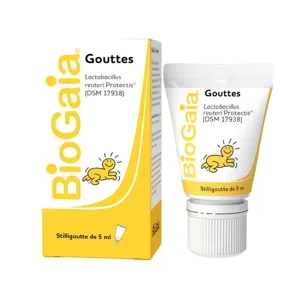We talk a lot about probiotics, these microorganisms useful to the intestinal microbiota. But are they really useful in babies? In which cases? Explanations.
According to the INSERM definition, the microbiota is “all micro-organisms (bacteria, viruses, parasites, non-pathogenic fungi that live in a specific environment”. Among the different microbiota present in the body, the most important is the intestinal microbiota. The latter is made up of bacteria, viruses, parasites and non-pathogenic fungi whose role is fundamental to health and development. It is enriched over the years under the influence of food diversification, genetics, the level of hygiene, the medical treatments received and the environment.
Baby’s microbiota: how is it made up?
When a baby is born, he has no bacteria in his gut. These will be brought to him by his mother during childbirth, during passage through the vagina, and he will therefore gradually build up his own microbiota. This will help the baby defend against infections, digest better, synthesize vitamins, develop your immune system. On the other hand, during a birth by cesarean section, the child will not be inoculated by the maternal vaginal and fecal flora, its microbiota will then be more fragile. In addition to the mode of delivery, another element has an impact on the baby’s microbiota: food. The bacteria present in breast milk, in particular bifidobacteria and oligosaccharides, would indeed help to build up and strengthen the child’s intestinal microbiota.
What are probiotics used for?
The WHO (World Health Organization) defines probiotics as “live microorganisms which, when ingested in sufficient quantities, exert positive effects on health, beyond the traditional nutritional effects”. Infant milks are sometimes enriched with prebiotics and probiotics. Their role will be to act on the composition of the intestinal microbiota and relieve baby’s digestive discomfort. Among the probiotic species used are Lactobacillus reuteri, Lactobacillus rhamnosus GG, Bifidobacterium lactis, Bifidobacterium infantis, Bifidobacterium breve, Lactobacillus fermentum and Saccharomyces boulardii.
When to give probiotics to the baby?
In a healthy baby, especially when breastfed, there is no reason to give probiotics. On the other hand, they can be useful in certain circumstances, but always under the supervision and with the advice of a doctor. It is necessary to choose the right strain of bacteria based on symptoms. All are not equal and are not effective for the same issues.
- Probiotics for diarrhea
During an episode of diarrhea related to gastroenteritis or antibiotics, probiotics can be useful to rebalance the intestinal flora. But they would also play a role in controlling diarrhea by reducing its intensity and duration. Among the most effective probiotics for diarrhea are Saccharomyces boulardii, Lactobacillus rhamnosus, Bifidobacterium bifidum, Lactobacillus casei, Bifidobacterium lactis and Lactobacillus reuteri.
- infant colic
Infant colic is diagnosed in more than one in four children. This is one of the main reasons for visiting the pediatrician. Characterized by digestive discomfort and repeated crying, they can be very difficult for babies to live with. Even if it’s a bad time to pass, probiotics could help baby pass this complicated course. They are therefore more particularly aimed at bottle-fed children who, on the recommendation of the doctor, can be offered infant milk enriched with probiotics. The strains Bifidobacterium lactis, Lactobacillus reuteri, Lactobacillus rhamnosus, or Bifidobacterium infantis are most often found. It is however not a miracle cure but can be an option when the child is very embarrassed.
These two products are the most frequently prescribed in case of colic. BioGaia Infant Colic drops are designed to fight baby colic as well as diarrhea and constipation. This product is rated 8.7/10 on Moms Reviews. Colicillus baby also limits abdominal contractions in infants.
BioGaia Drops Lactobacillus reuteri Protectis (DSM 17938)
How the pricing table works
See more offers
See less offers
The price offers are listed in ascending order of price. The prices displayed are inclusive of VAT (all taxes included). The price of postage displayed corresponds to the cheapest home delivery offered by the merchant. aufeminin.com references in its price tables the merchants who wish to be present on the condition that they display prices with VAT (including VAT – all taxes included) and that they present an excellent level of quality of service and customer satisfaction. This referencing is paid. Our price tables are therefore not exhaustive of all the offers and merchants present on the market. The offers present in the price tables are updated daily and several times a day for certain shops.
PEDIAKID Pediakid Colicillus Baby
 © 62c437d8d5b2d62c437d8d
© 62c437d8d5b2d62c437d8dThe price offers are listed in ascending order of price. The prices displayed are inclusive of VAT (all taxes included). The price of postage displayed corresponds to the cheapest home delivery offered by the merchant. aufeminin.com references in its price tables the merchants who wish to be present on the condition that they display prices with VAT (including VAT – all taxes included) and that they present an excellent level of quality of service and customer satisfaction. This referencing is paid. Our price tables are therefore not exhaustive of all the offers and merchants present on the market. The offers present in the price tables are updated daily and several times a day for certain shops.
- Probiotics are not automatic
Even if, as we have seen, probiotics can be useful in certain very specific cases, it is useless to give your baby a course of probiotics in the form of a food supplement for no reason. In any case, it is preferable to avoid self-medication and seek advice from the child’s doctor or pharmacist, especially since there are many strains of probiotics. It is then a little difficult for parents to find their way around!
